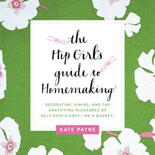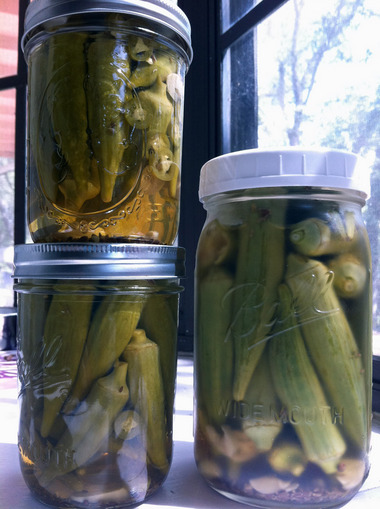Refrigerator pickled okra
I’ll get to the pickles in just a moment, but first I wanted to briefly touch on recipes, as I’m entering a new phase for me personally, one where I’m doing a lot of recipe testing for my next book.
The thing about recipes (and posting to your blog the things you successfully follow along with in published books) is that someone did a lot of work to make sure that recipe works, such that you were even able to succeed in your attempt. When we lift stuff directly out of a book, without making any real changes that warrant a re-written/re-described version and then post it to the free, unlimited access realm that is the internet, we’re not properly honoring our inspiration.
That said, the internet is a great source of inspiration, and there are many talented, hard-working food bloggers out there who are legitimately adhering to an accepted code of ethics. But we as readers can’t forget to consult and honor the cooks and authors who spent countless hours developing, making, tweaking and testing the recipe, and then writing it up in a clear and understandable manner. A great published recipe, whether it is in a book or on a blog, represents hours and hours of hard work as well as no small amount of blood, sweat and tears. If we keep that in mind when discussing recipes, it will be easy to share responsibly.
I’d like to thank my friend Kaela, blog maven behind Local Kitchen, and Linda Ziedrich, author and preserver extraordinaire, for their help in crafting this post and drafting the following quick list of tips to help you remember what do when it comes to posting recipes:
- If posting a recipe that’s already online, link back to the original source
- Definitely don’t copy word for word (you know, plagiarism) from book or blog recipes. Other people read those books and blogs, too, and will know when you’ve borrowed in this way.
- If you want to publish an already published recipe as is, ask the publisher for permission.
- If you want to publish an already published recipe in your own words, with minor changes in ingredients, quantities, or method, just say your recipe is based on “insert original author here”, and, to be polite, cite the book or other source. You don’t need anybody’s permission to do this.
A couple of other friends have written about these issues lately, too; check out Marisa’s post called Making a Recipe Yours and Sean’s post about original content and attribution. Readers and writers alike are all a part of the same community; it’s good to check in and make sure we’re keepin’ it real, yo.
Linda Ziedrich was kind enough to magnanimously grant me access to posting her pickled okra recipe here on the blog (which I still don’t actually feel like I did enough to make it truly my own). If you’re busting into canning this season and looking to expand your oeuvre, I’d suggest adding her books to your to-own, to-check-out-at-the-library, or to-borrow list ASAP.
Thank you for hearing me out, and now onto the gracious pickled okra recipe. I’m actually going to make it small, so you can refrigerator pickle your stash and, in the event of an okra windfall, simply multiply and seal for shelf storage. I’ll also add that this recipe was initially requested by a friend who admitted to not even liking okra (while she and her kids polished off the remainder of a jar of them) at a recent event. Happy pickling!
Fridge Pickled Okra
Slightly adapted from the original recipe found in Linda Ziedrich’s Joy of Pickling, Revised Edition (The only significant change I’ve made is to use white wine vinegar in place of cider vinegar.)
yields 1-quart jar
1. Wash and trim the stems of 10-12 oz okra, no need for precise measurement here, your goal is to fill one quart jar so they’re packed in tightly. Smaller okra pods are preferable, but I certainly understand when life grants you ginormous pods (see quart jar above)! They still turn out delicious.
2. Clean your quart jar well, and add to it:
- 2 cloves garlic, sliced
- 1 tsp dill seeds
- [optional] 1 dried or fresh hot pepper, halved lengthwise (I used a serrano)
3. Pack okra into the jar, and don’t be afraid to really cram it in there.
4. To make the brine, dissolve 2 Tbs pickling or kosher salt in 1 cup distilled water and 1 cup white wine vinegar and bring to a boil in a small stainless steel saucepan.
5. Pour hot brine into packed jar and put a lid on it (I just like saying that). Don’t screw on the lid too tightly or some of the gasses that are the result of your okra nearly being pickles won’t be able to escape. (The lid might pop off when you open it later on, which, in this case, it’s still safe to eat.) Let sit on the countertop to cool for about an hour and then place jar in the fridge. (If canning these for shelf storage, process pints for 15 minutes and quarts for 20 minutes.)
Your pickles will be tasty after 2 weeks, dee-lish after 3 weeks and friggin’ fantastic after 4 weeks. Break into them whenever you feel the need. They’ll keep on the upwards of 3-6 months in the back of the fridge (says the forgetful pickler who has discovered many a treat waaaaay in the back…).





 Thursday, August 18, 2011 at 8:17AM
Thursday, August 18, 2011 at 8:17AM

Reader Comments (25)
Well said. I tend to follow recipes since I enjoy the process. I've never fancied myself a recipe developer - low attention span. At any rate, I hope I am doing justice to those recipes I've shared - whether I tweaked them or not. Food for thought.
This post is perfectly timed for a series I've been planning on my blog. Friends, especially moms, ask me to share the recipes I use for our nightly family dinners. Now I have a guideline for what's appropriate and ethical. When you give proper credit, it's like saying thank you to the creator. Thanks for the information, Kate!
great, concise ethical practices that help us 'newbies' keep it real. thanks, kate!
Thanks for this post! I recently started blogging and was not completely sure about all of the blogging and copywriting laws/etiquette. Your pickled okra looks great too. I didn't plant enough okra this year to harvest enough to can a batch of pickles all at once, so this looks like a great way to still enjoy some okra pickles before fall gets here.
Hi Kate,
I'm making this pickled okra. Is it OK if the tips of the okra stick up above the solution? Thanks!
I have made this recipe twice now...thanks so much!
Quick question...does anyone know why my garlic clove would turn green??? That did not happen the first time!!!
Hey Debbie, young garlic (garlic that hasn't cured for a long time in storage) will turn green or blue when exposed to vinegar. Not to worry, totally normal and safe!
One more question...can I use this recipe for water bath canning, too?
Yes, totally Debbie! Good question and glad you asked :)
pretty much used this recipe , on my own about a week ago. wanted to taste it to see how they were coming out . question is will the okra stop being slimy over time ? after a week not very appealing taking it out of jar ! taste is great though. would like to make more , but if they stay slimy , not sure about doing it
Craig, okra is unfortunately slimy when cut, which is I prefer to keep them whole with a minor slit in the sides. This doesn't prevent sliminess, but it helps to keep it to a minimum. After a few months I do think the sliminess subsides a bit as it becomes integrated into the brine.
LOVED this recipe, tasted my first batch recently and they were so good!!
Quick question...will they taste as good using regular white vinegar?
Thanks!
Debbie, you might lose a little flavor complexity that the white wine vinegar offers, but they shouldn't taste drastically different. Give it a try with distilled white and let me know how it goes!
Hello!
Great recipe. I've made three quarts and am impatiently waiting one more week to have a taste. I do have a question, since my okra plants are coming into their prime and starting to produce heavily. How long would you process pickled okra in a water bath canner in quart-size jars? I was thinking 15 minutes, does that sound about right? I've looked around the internet, but can only find processing times for pints.
Thanks! =)
Hey Lori,
Great timing, I just processed quarts of okra for 20 minutes. The National Center for Home Food Preservation says pints should be processed for 10 minutes, so 20 minutes will work for quarts.
Well, this certainly seems a healthier way to prepare okra than fried. If I were to process them to make them shelf stable, would a water bath work or do I need a pressure cooker? Great blog, by the way. Love your site.
Thanks, Cristi! Yes, you may waterbath can them with this acidity ratio in the brine, pints for 15 minutes, quarts for 20.
best,
Kate
One lid sealed, two did not. How long are they good in the fridge? This is the first I've pickled anything. (Hubby loves loves loves them as does my daughter btw.) I'm basically clueless.
Hey Melissa,
Good job! Unless you processed them in the waterbath canner pot for 15 minutes and followed canning proceedures for sealing the jars properly, you should keep all the jars in the refrigerator, where they will keep indefinitely provided there's no double dipping or utensil reuse to introduce new things to the jars as you eat them. They'll get tangier after about 6 months since the osmosis process continues, but are still fine to eat.
Um... I don't have a stainless steel sauce pan! How will using just a regular non stick pan affect it?
Hi Karen,
You will be fine to simmer the brine in your non-stick pot. If you get really into pickling you might consider grabbing a plain stainless saucepan from a thrift store to avoid the constant exposure of the non-stick chemical compound to really acidic brine which can leach chemicals into your brine.
What happens if you just put okra and salt in a jar with the vinegar in the fride be without boiling it first?
Hi John,
Not boiling the brine prior to pouring it over the veggies means you are not getting the initial shock to the produce that helps open the cell membranes and kicks off the osmosis action that is the physical process of pickling.
This might be a small detail, but can I use cut and sifted dill instead of dill seeds?
Hi Kalista,
Sorry for the delay in response. Nothing bad will happen, but cut and sifted (dried) dill is not as flavorful as the seeds, which pack the dill punch. Next time you make the recipe go for dill seeds, fresh dill or the dill flowers!